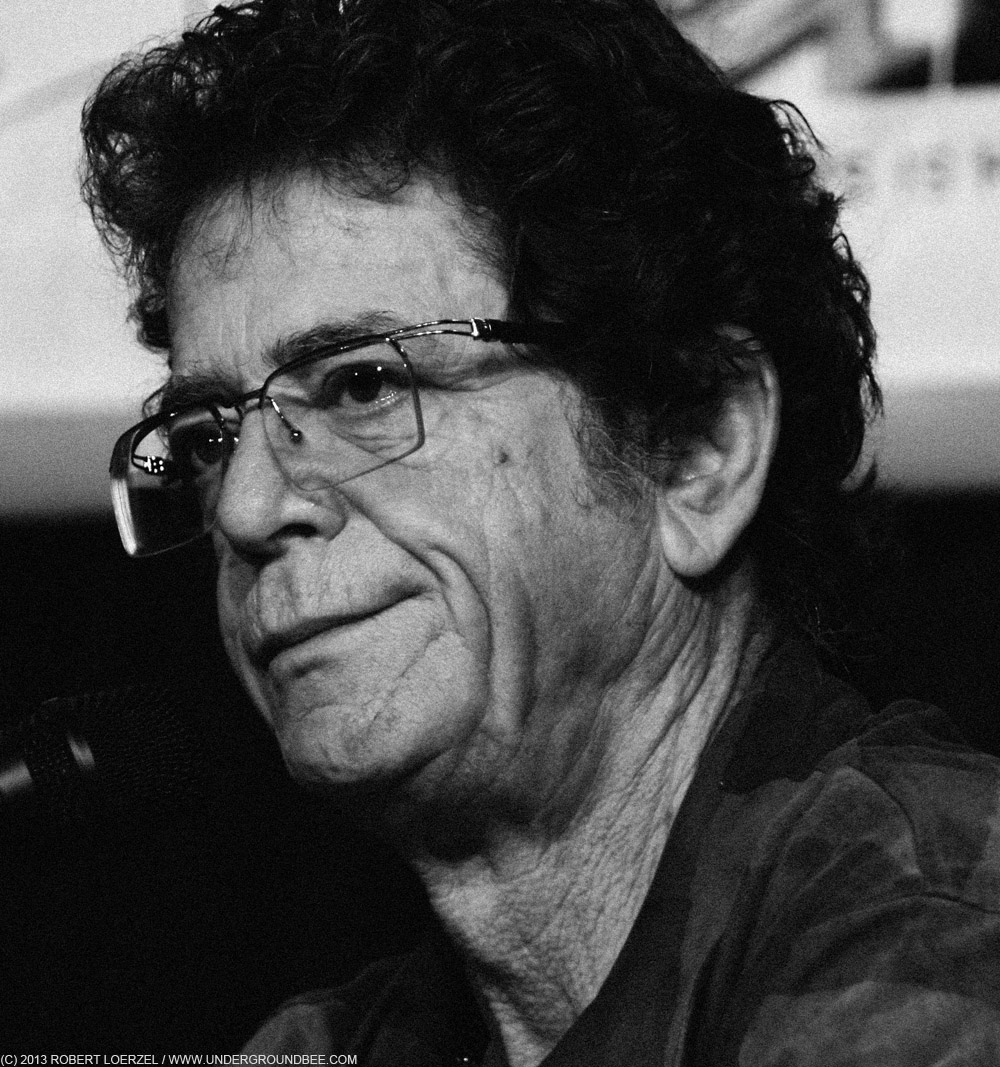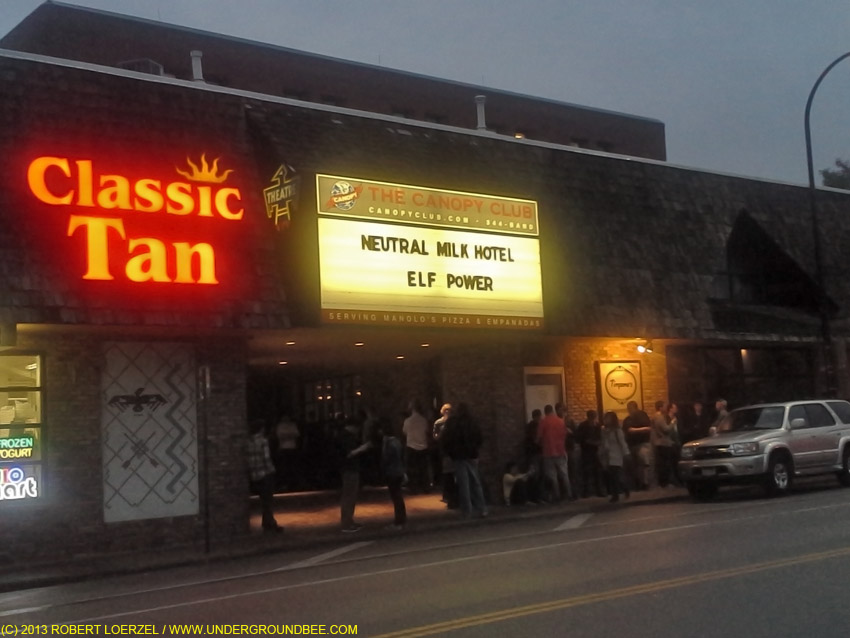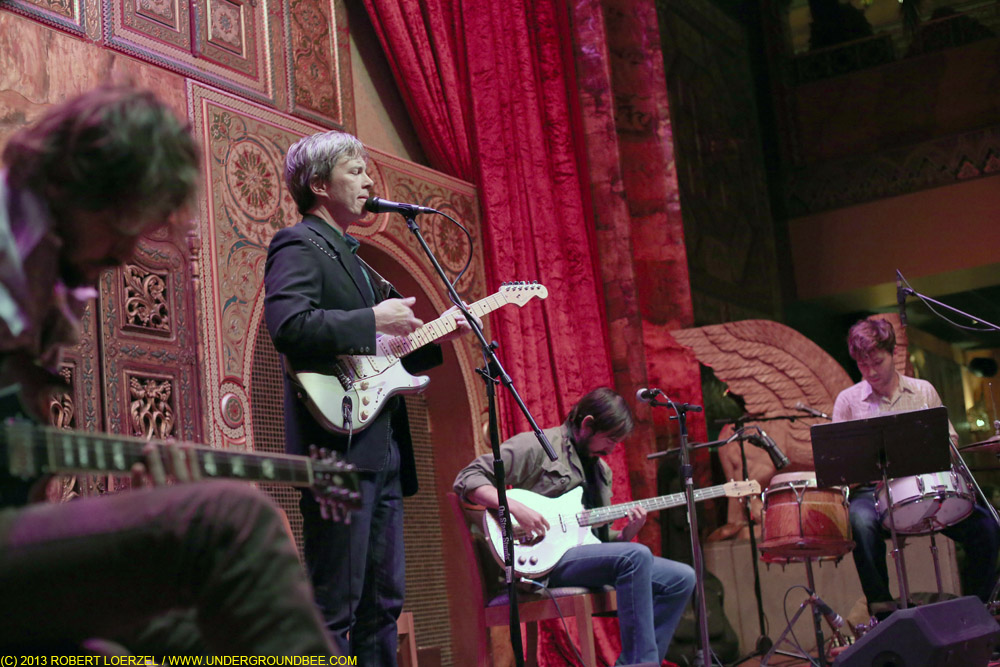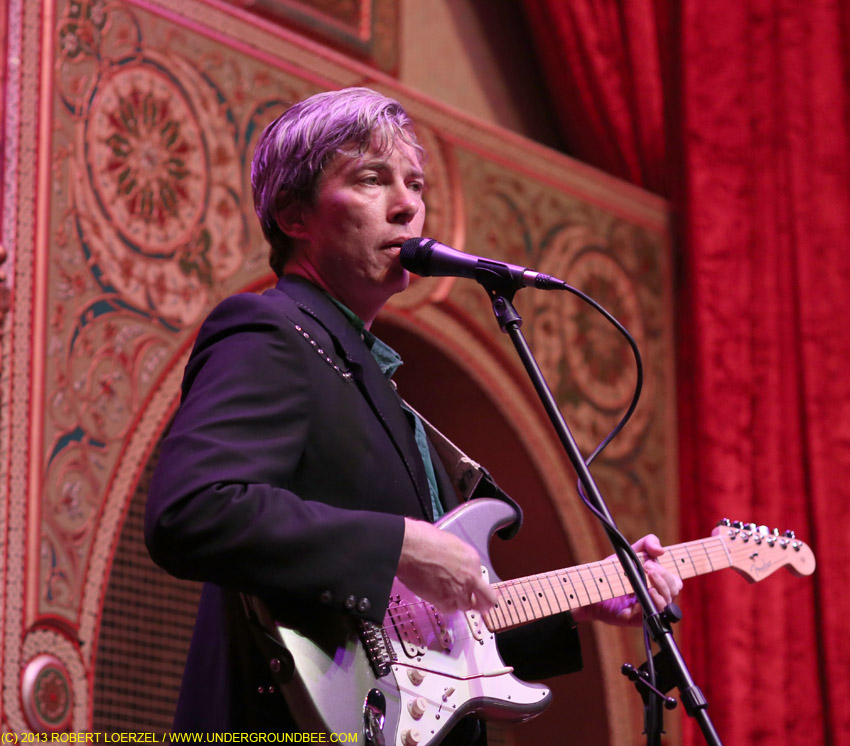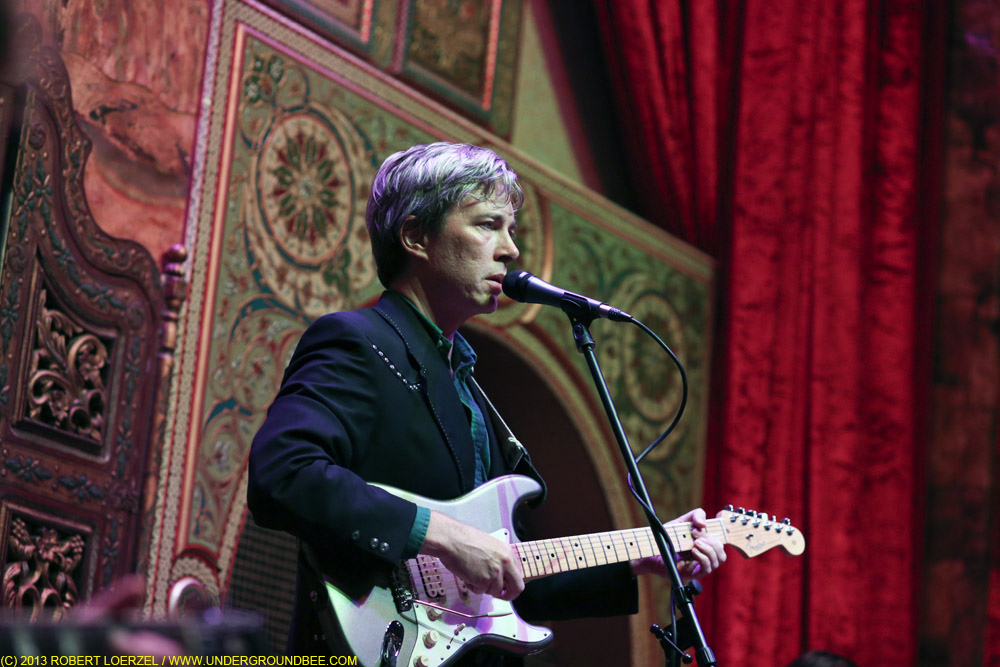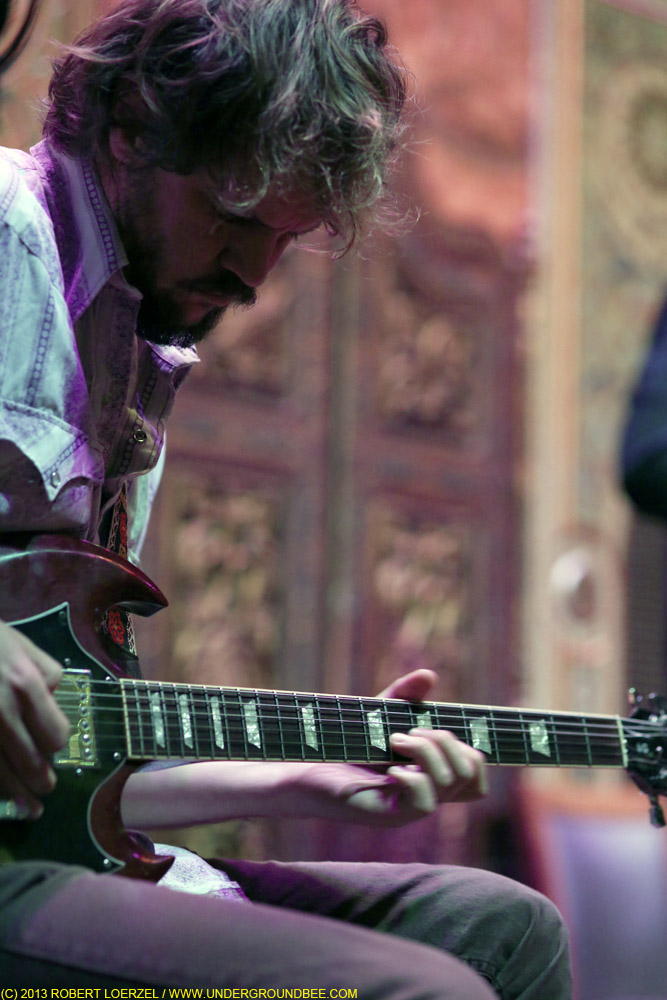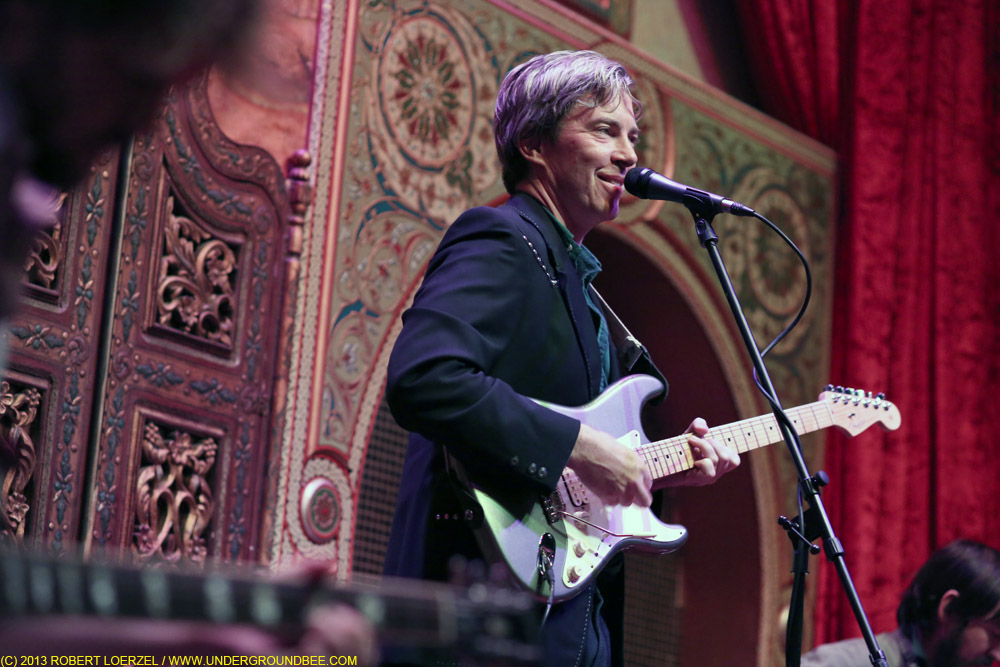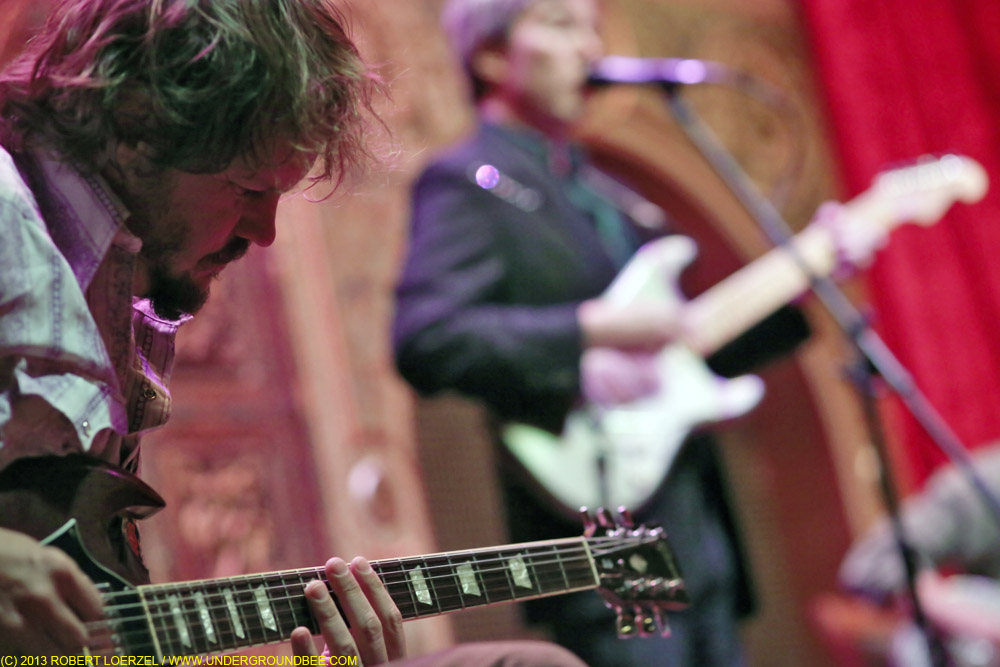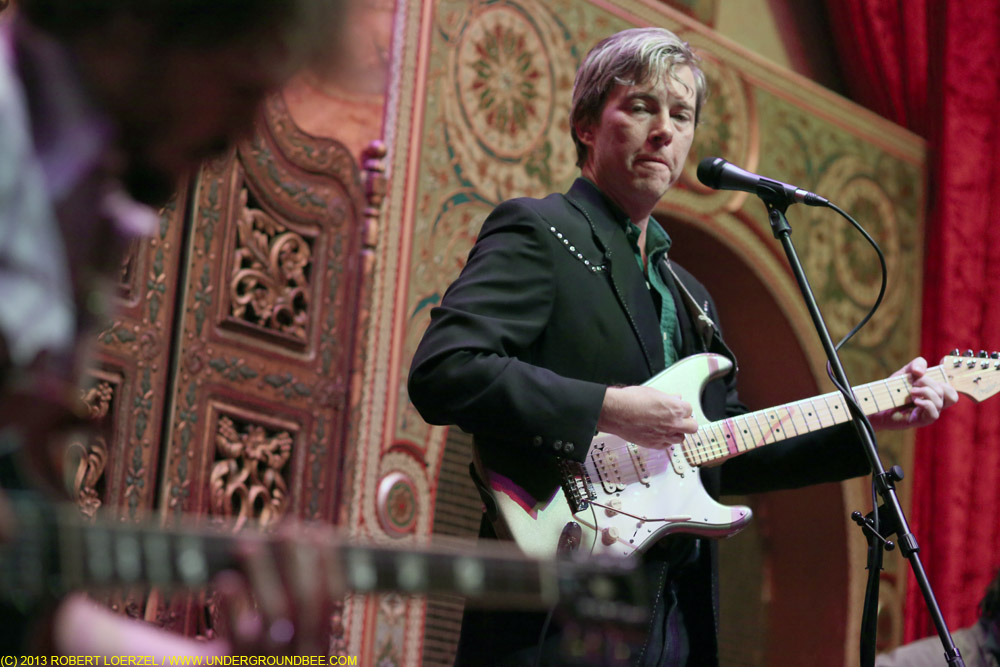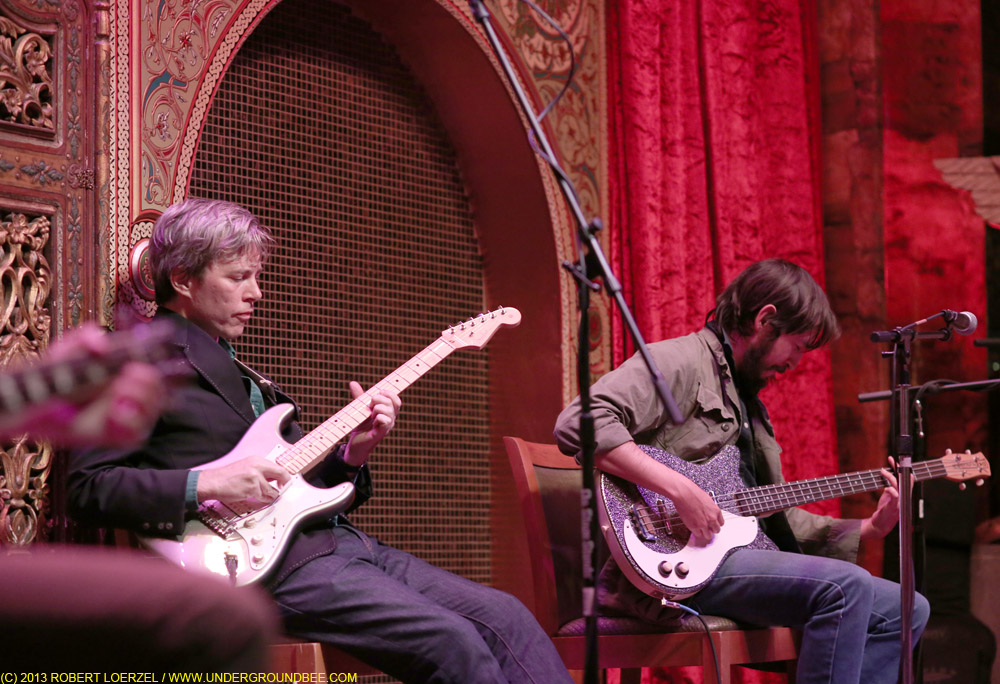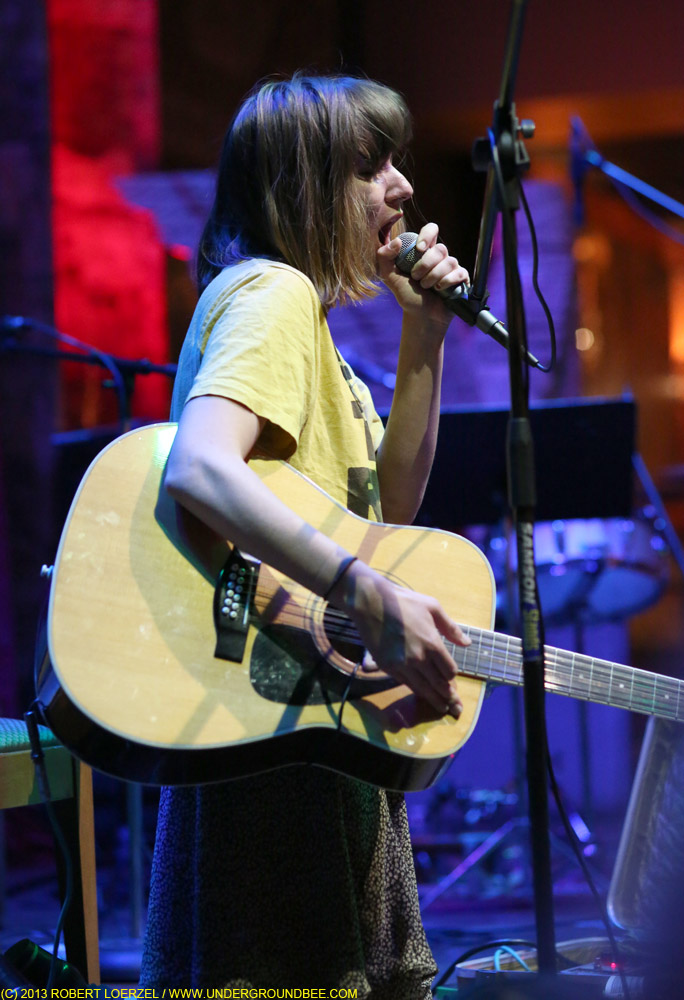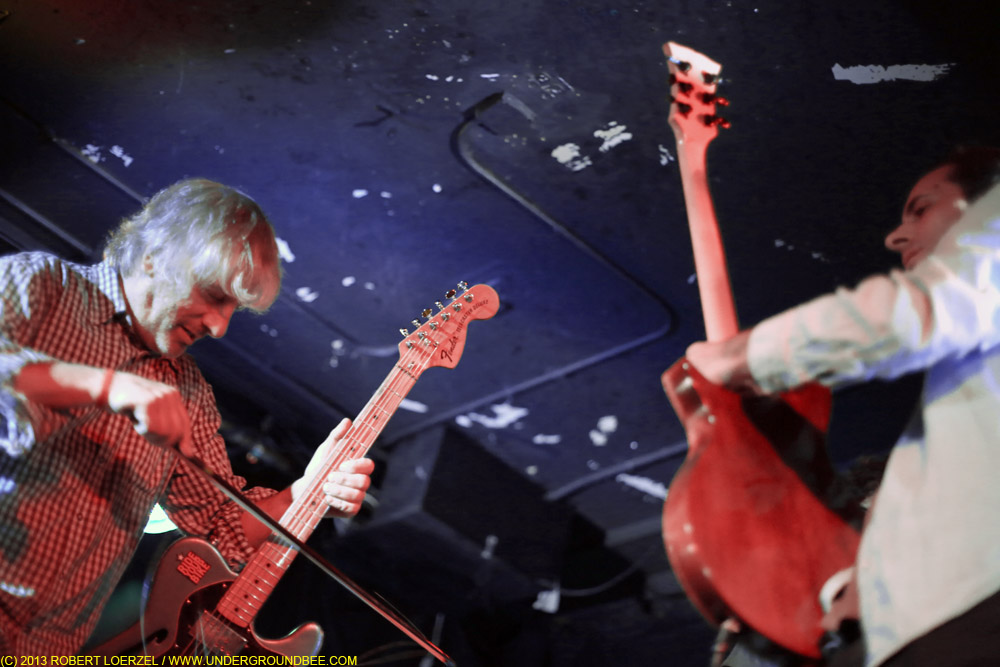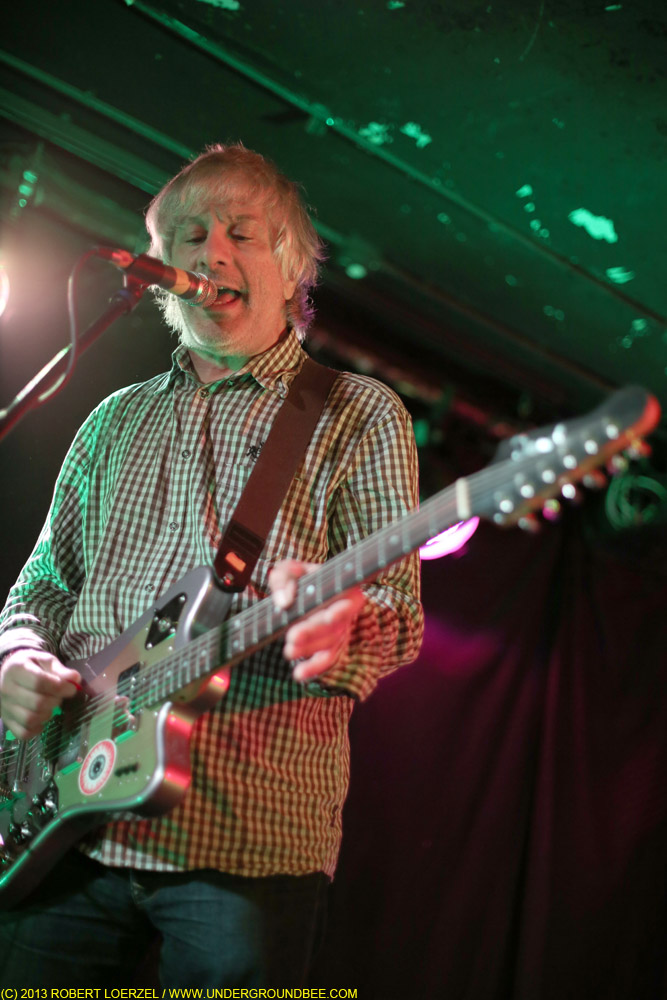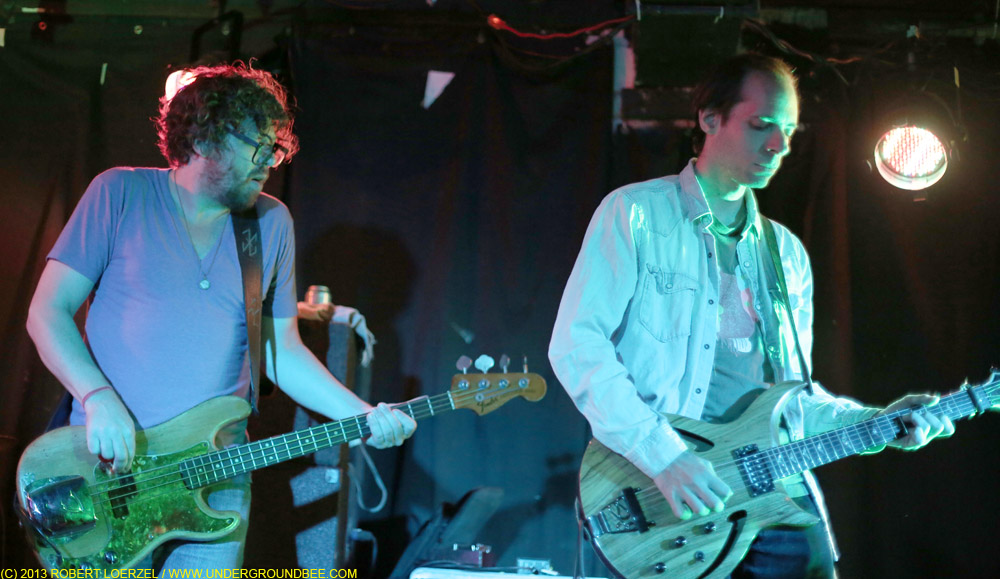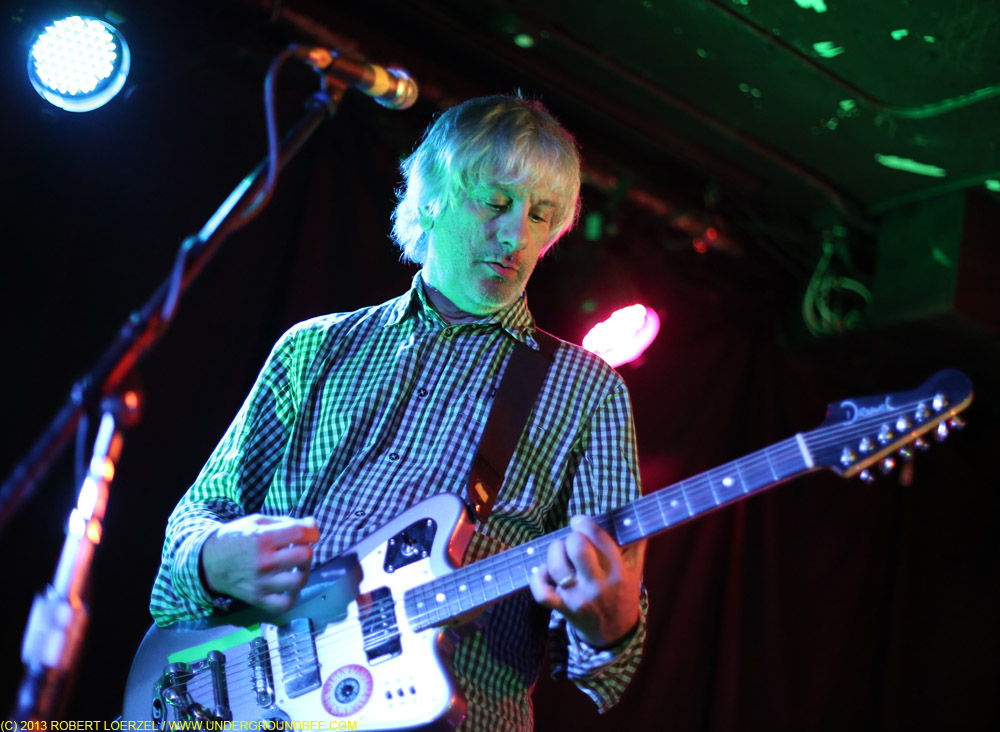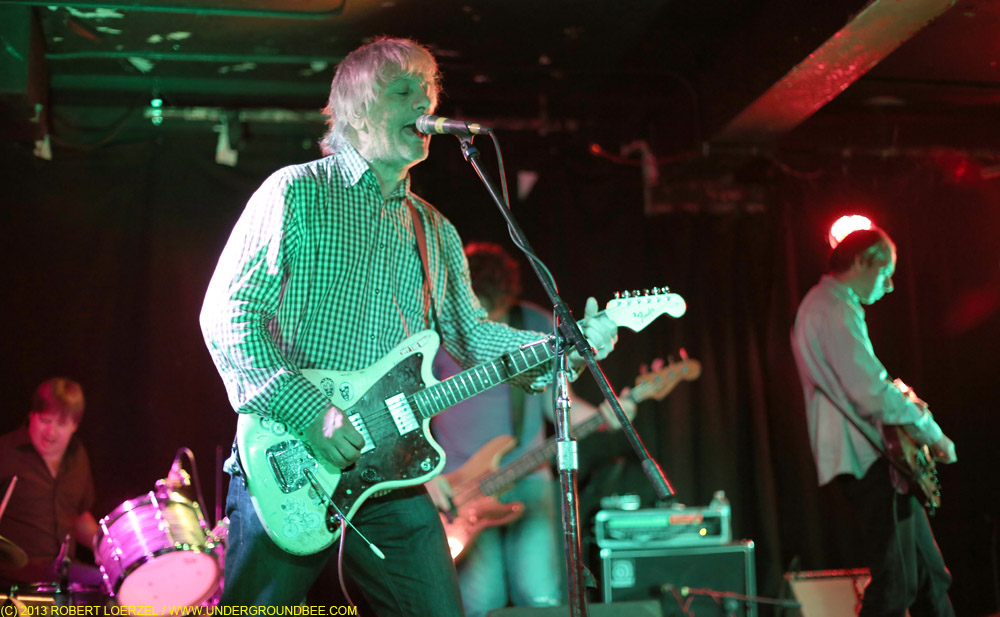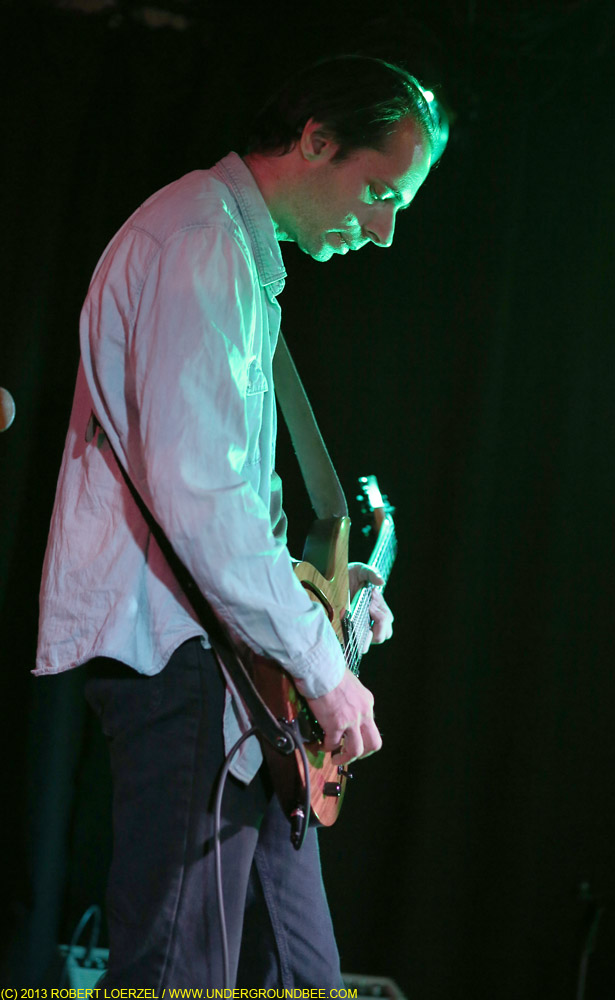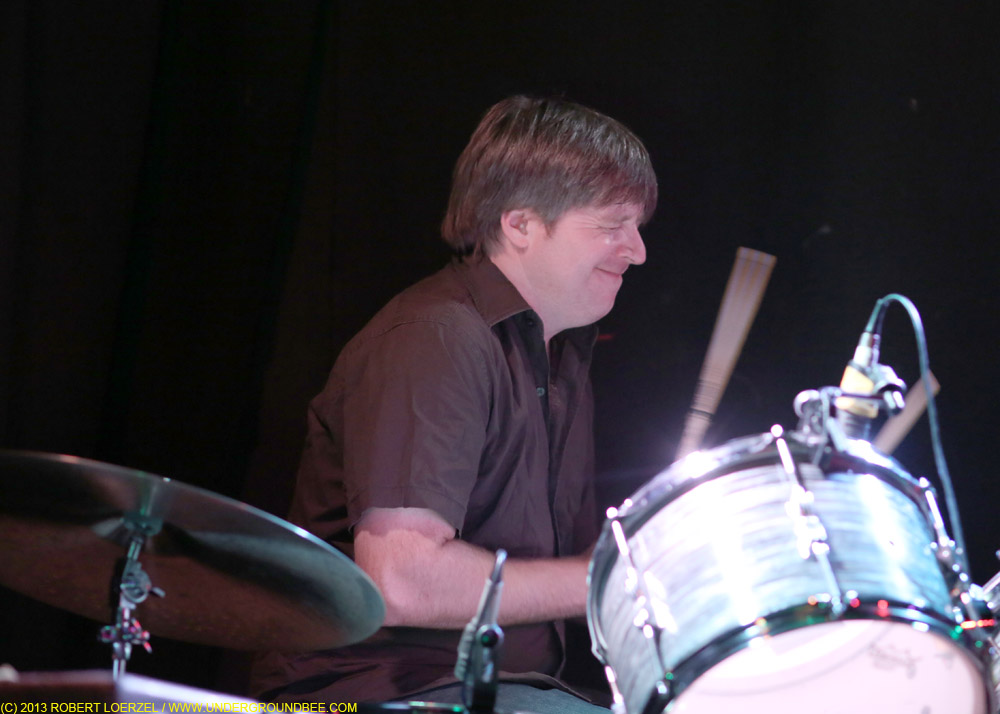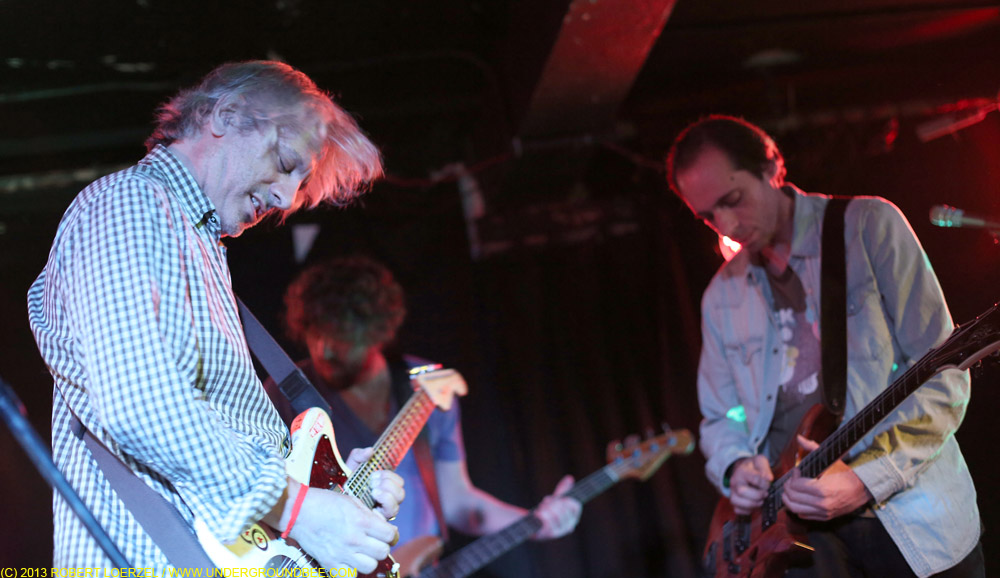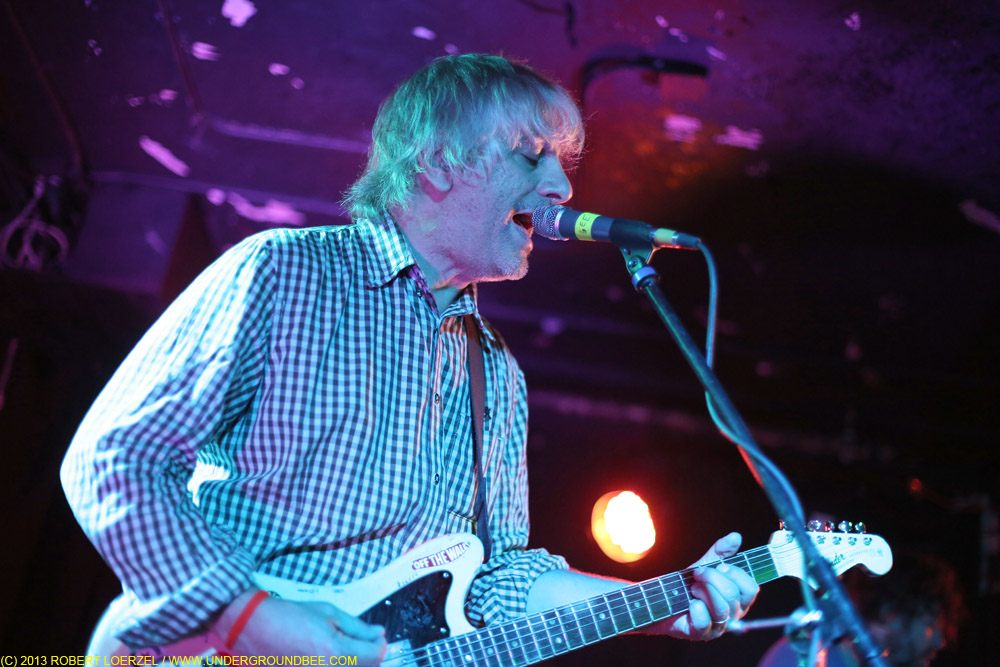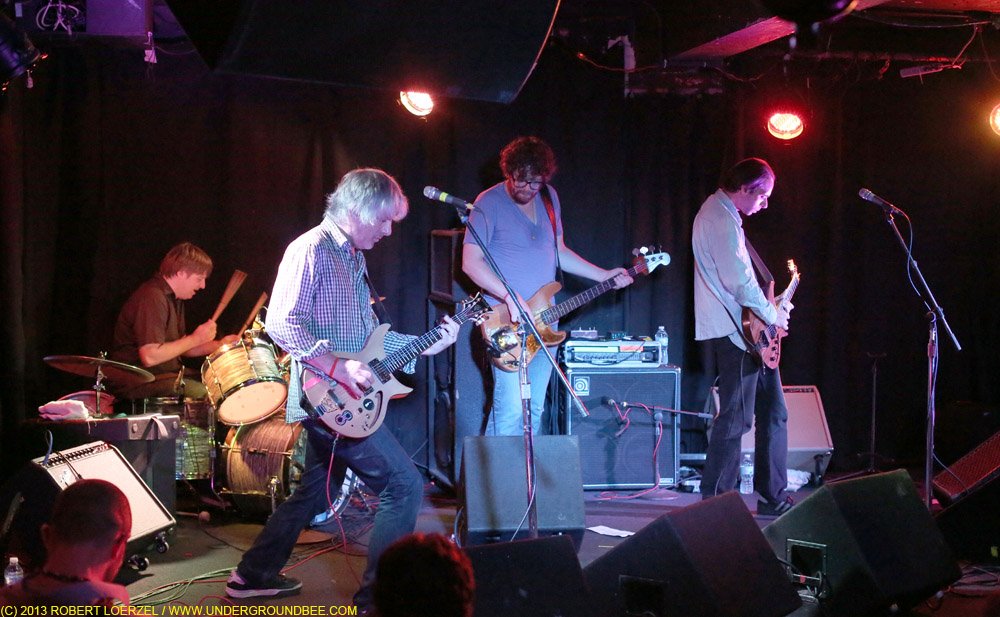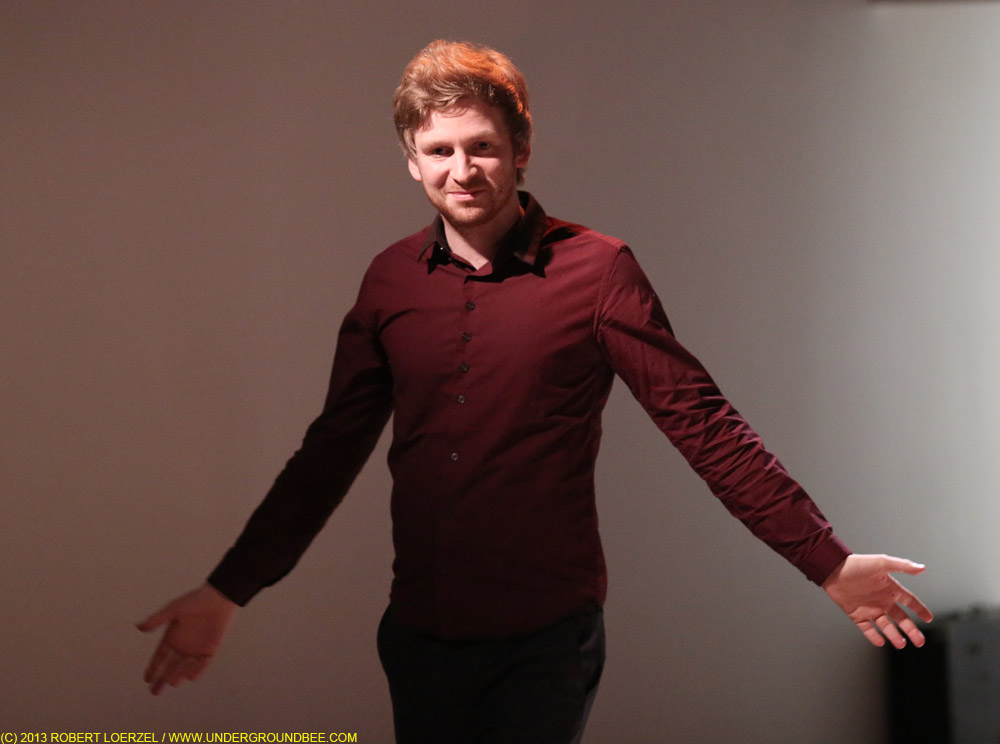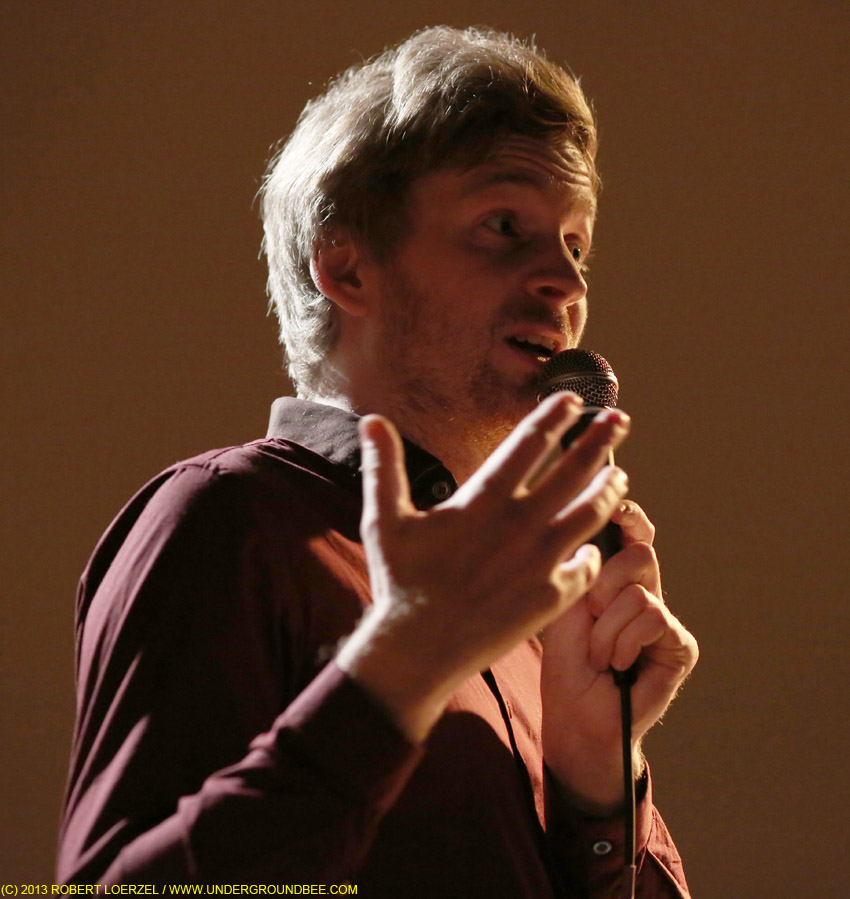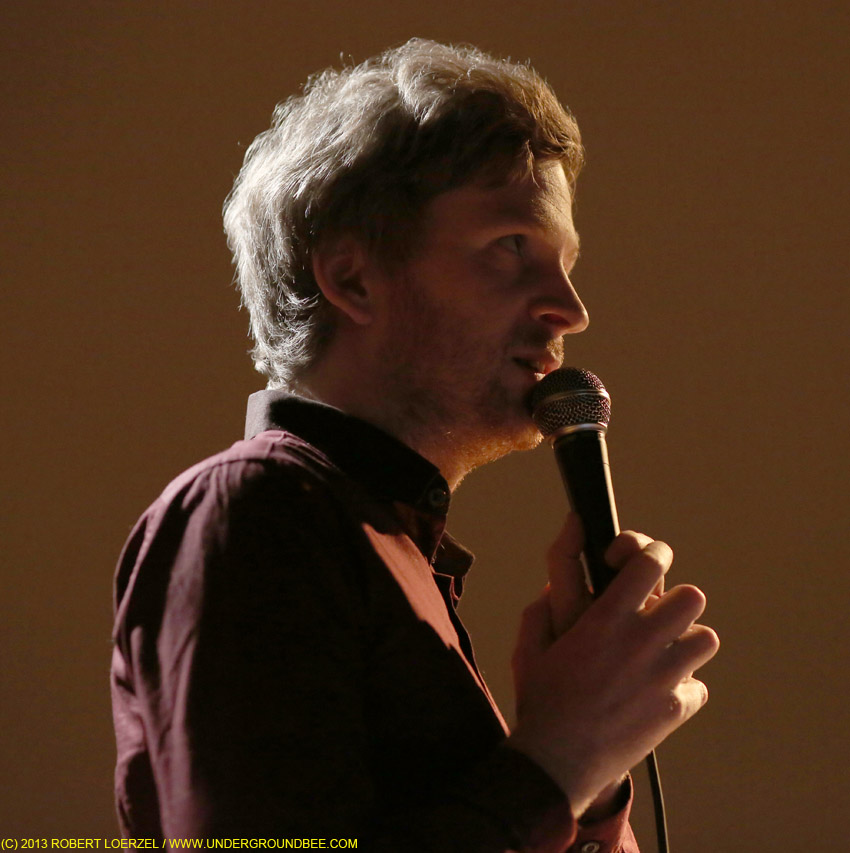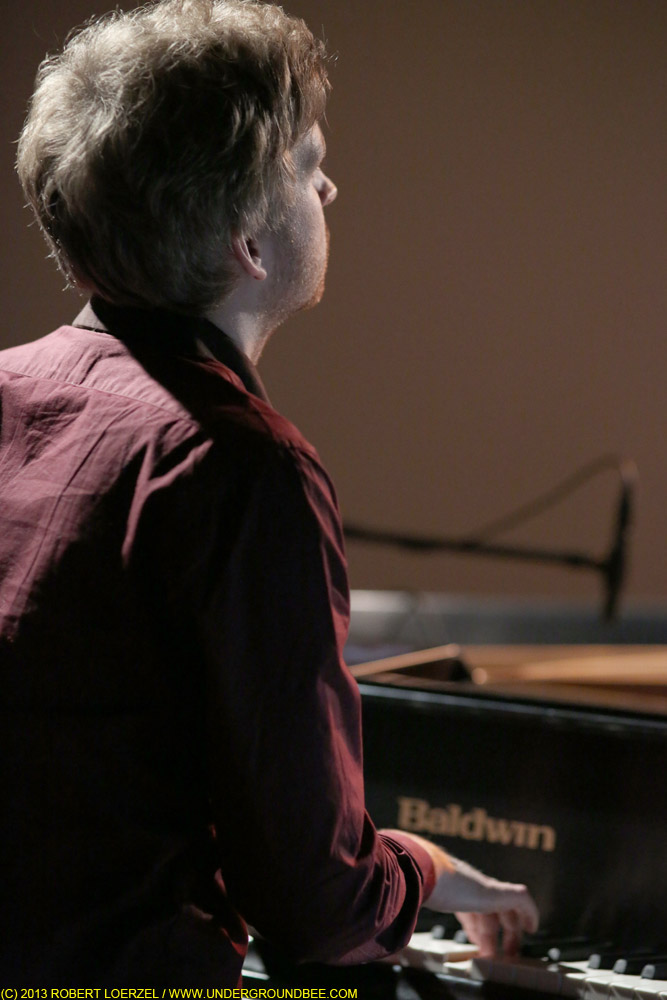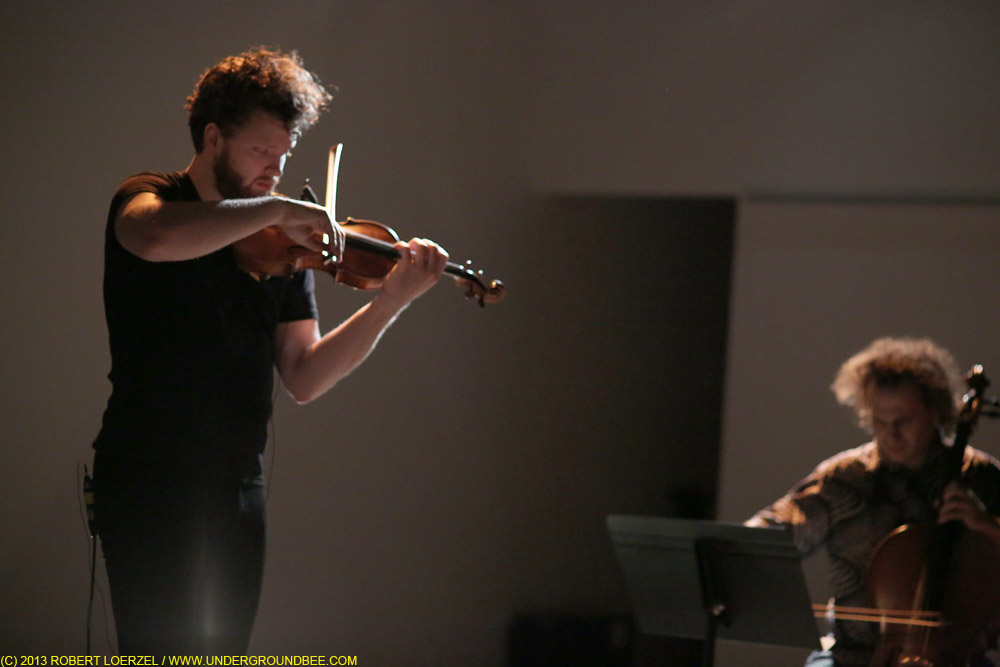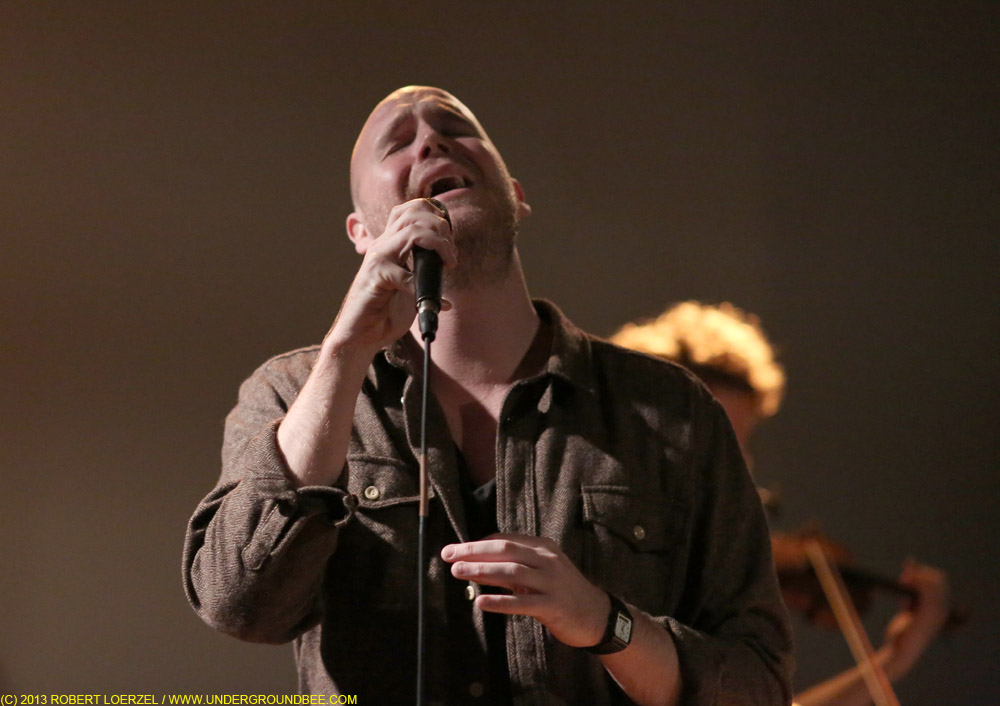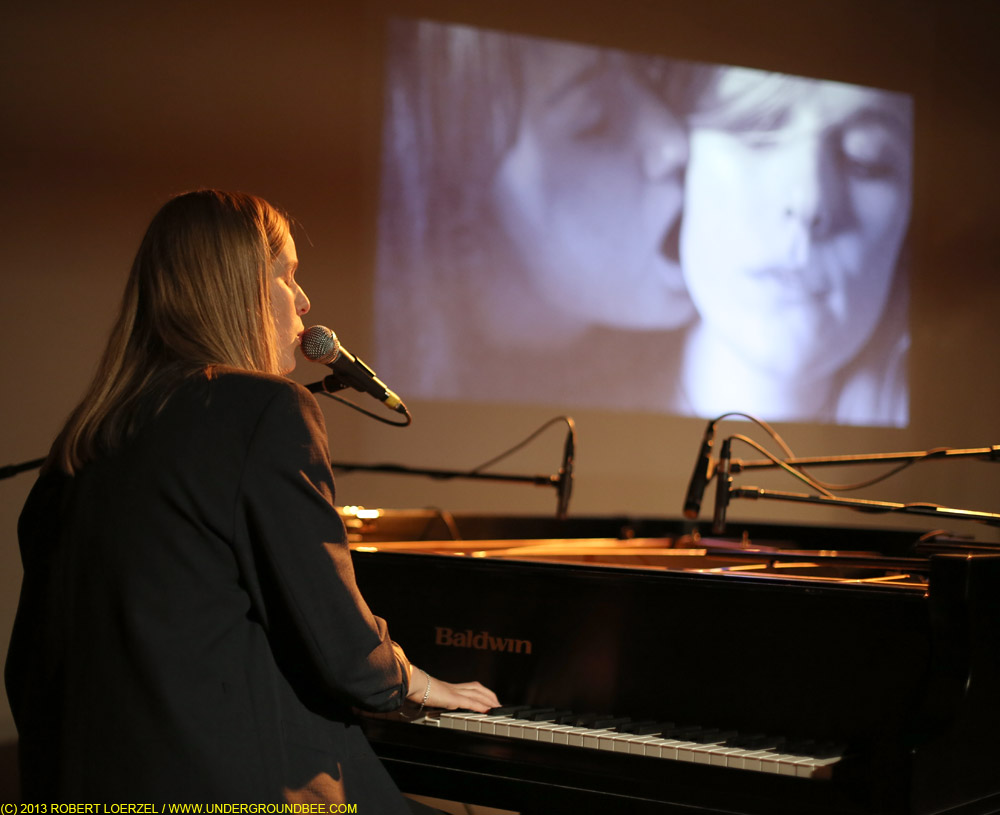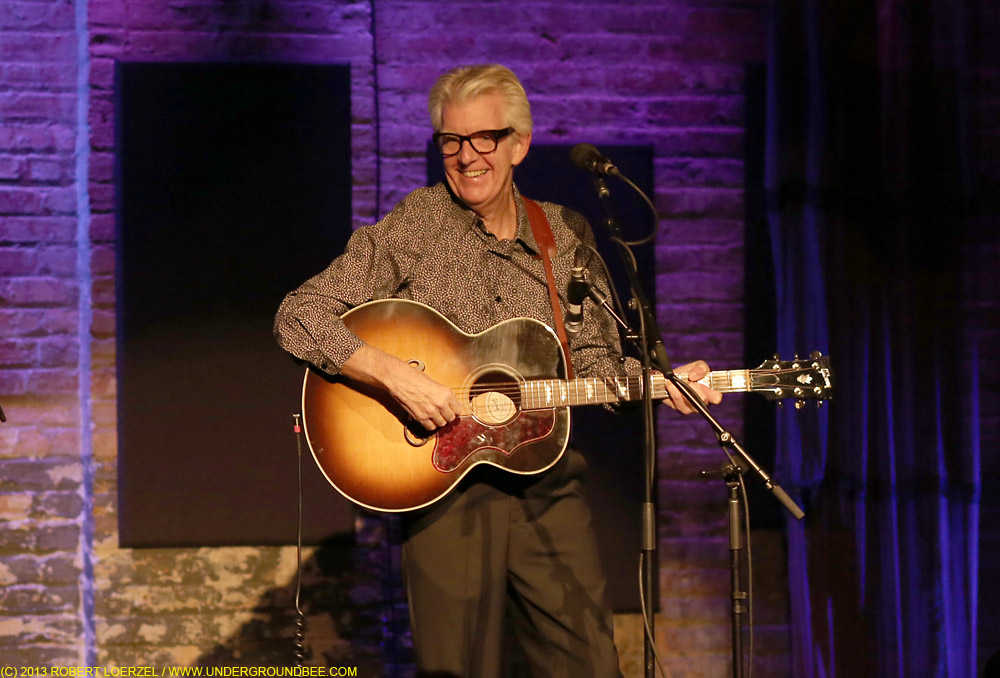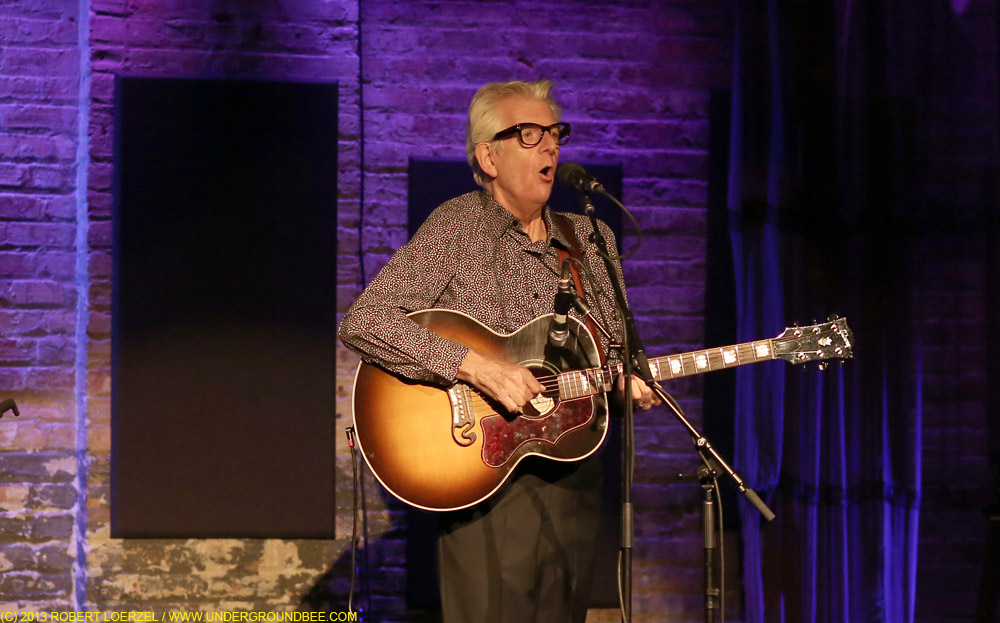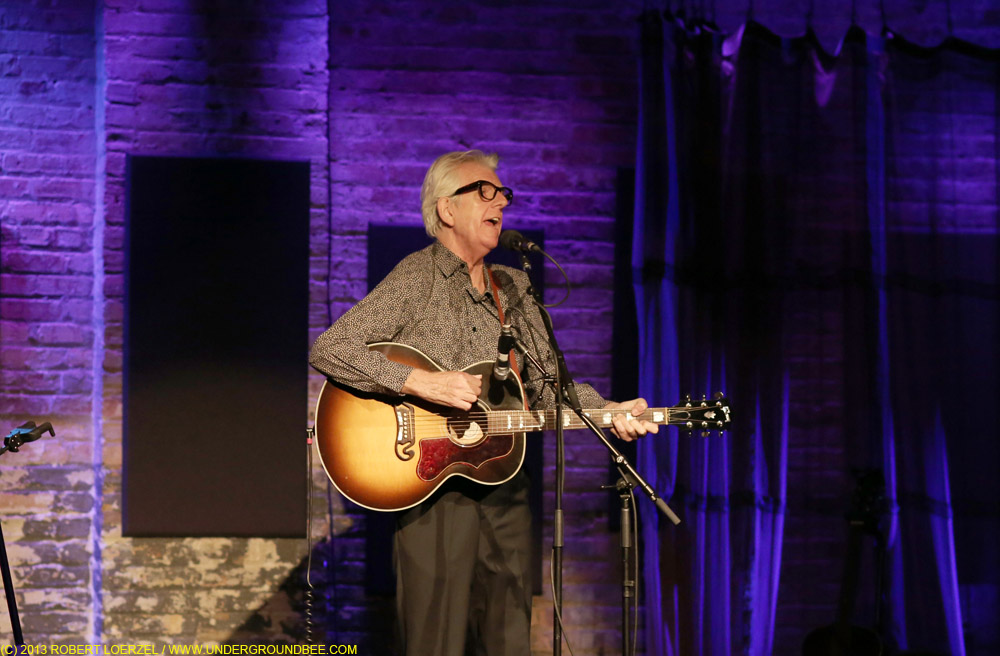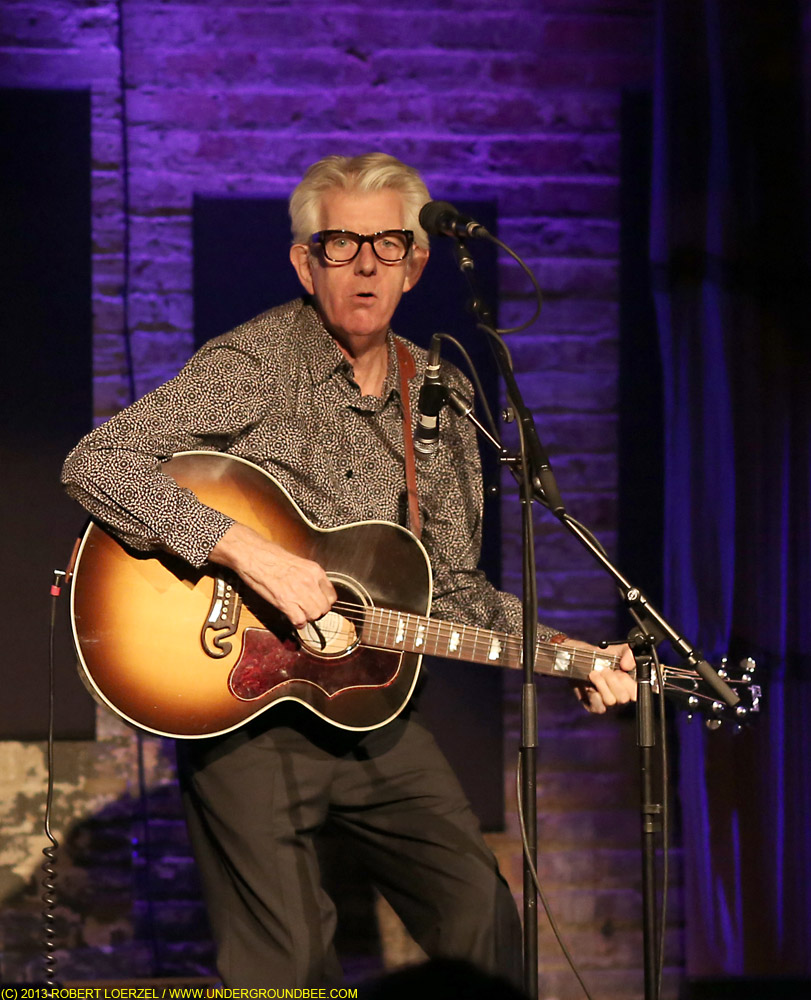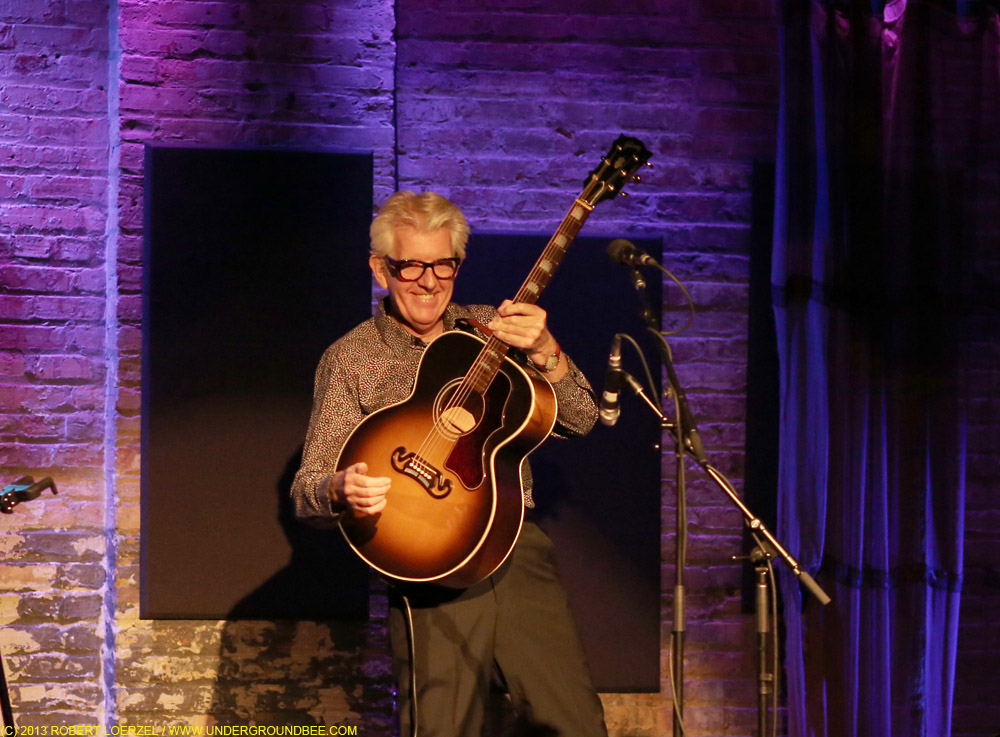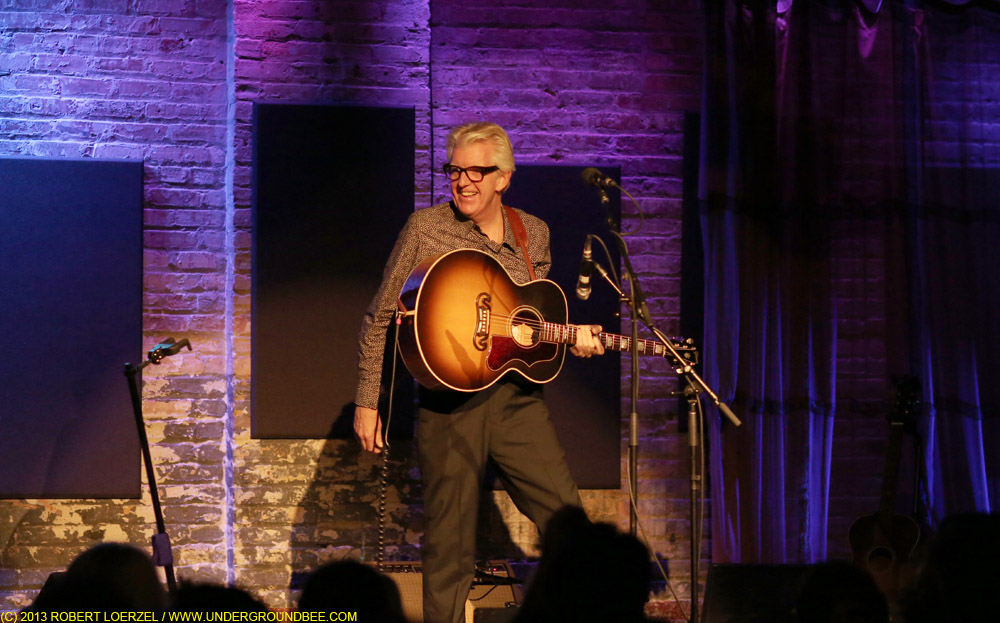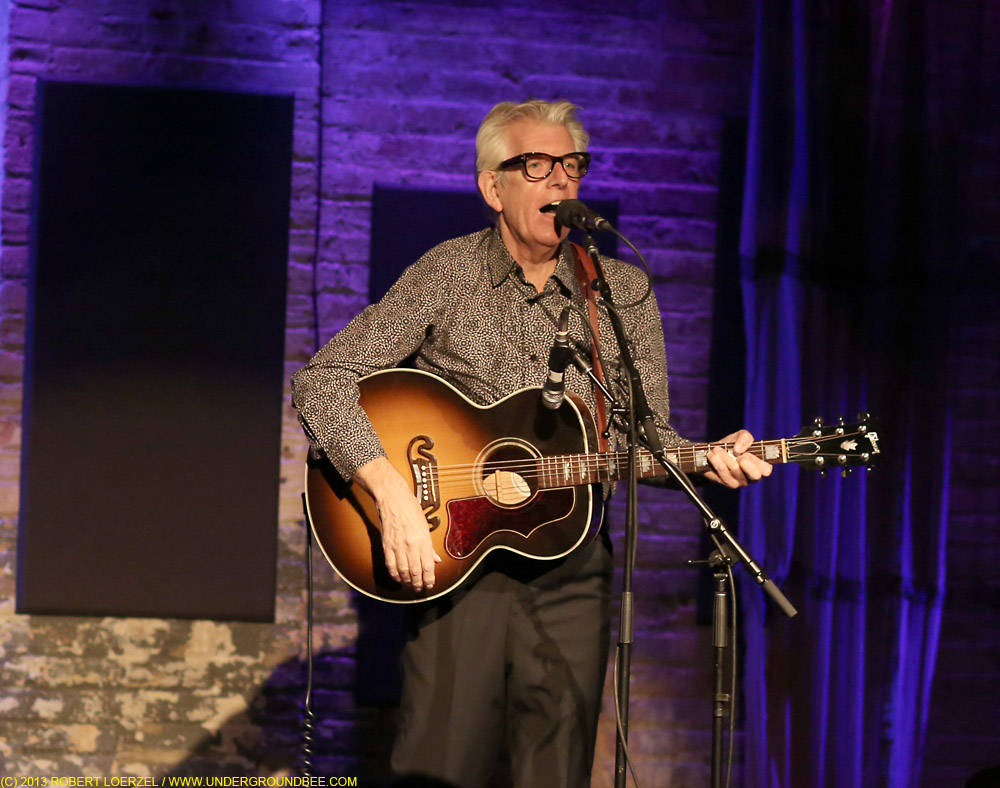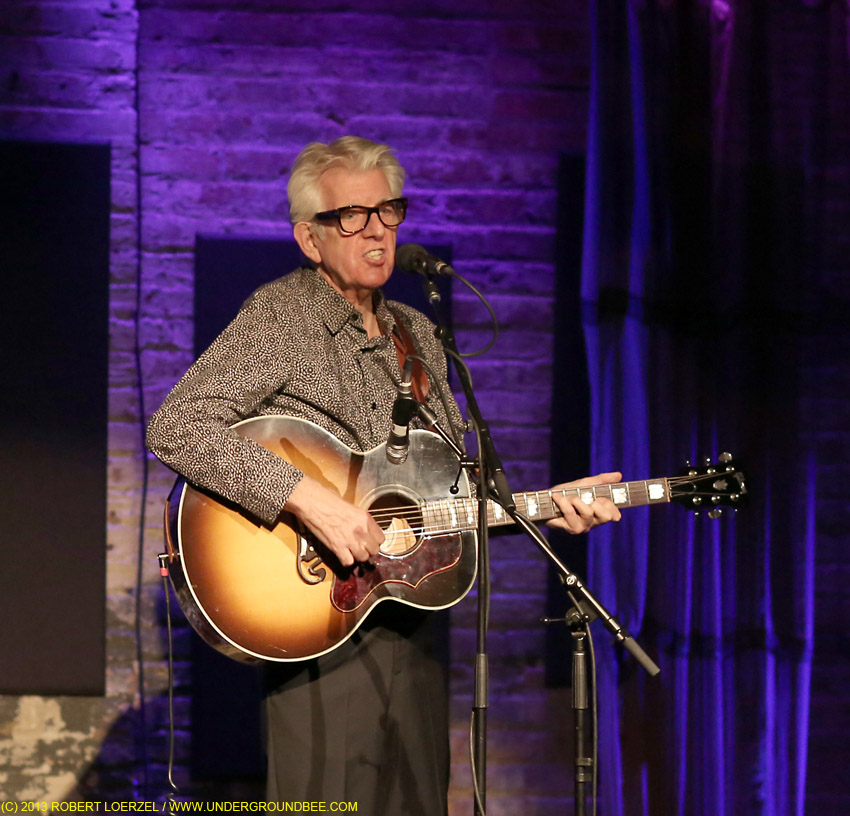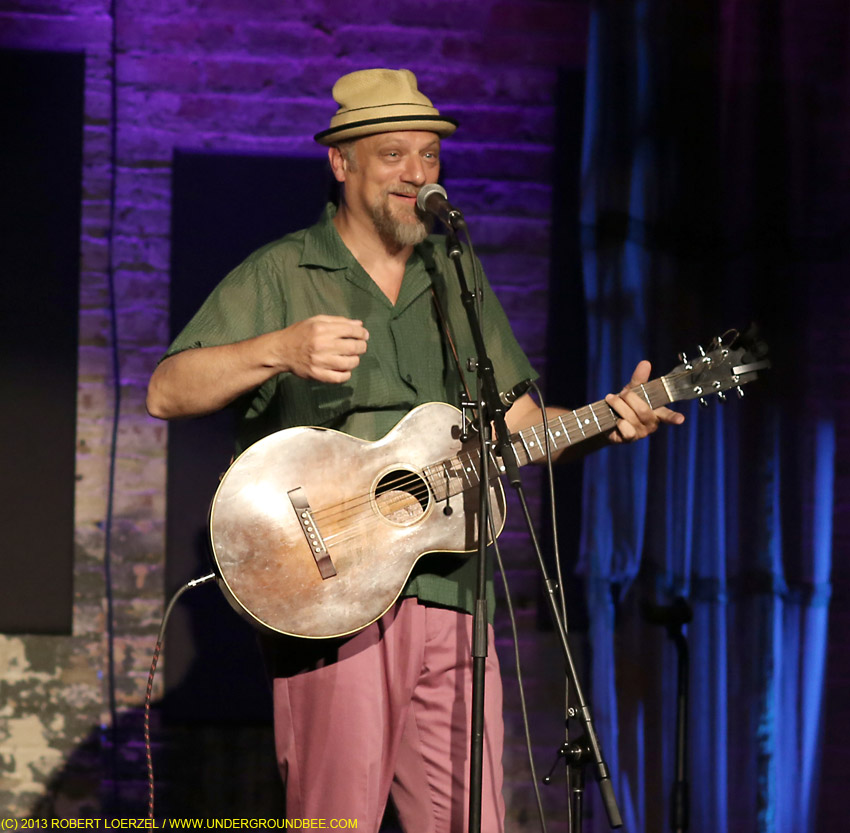Neutral Milk Hotel at the Canopy Club
Until last year, concert audiences hadn’t heard from Jeff Mangum in years. Neutral Milk Hotel’s singer-songwriter finally emerged out of what seemed like seclusion to play his old songs, which had been growing in popularity ever since he put them on record. During those concerts in 2012— I saw one in Chicago and one in Milwaukee — it felt like a solo acoustic set by Mangum was all we really needed. After all, his voice, lyrics and acoustic guitar strumming are really the heart of Neutral Milk Hotel’s best-known (and best) album, 1998’s In the Aeroplane Over the Sea.
But a Jeff Mangum solo concert wasn’t quite the same thing as a Neutral Milk Hotel concert. And now, continuing to move at his own strange pace, Mangum has decided to bring the band back together for an extended tour (including original members Jeremy Barnes, Scott Spillane and Julian Koster as well as a couple of auxiliary players). The first dates that were announced didn’t include a stop in Chicago, but I snagged a ticket for Neutral Milk Hotel’s Oct. 15 concert at the Canopy Club in Urbana. (Since then, the band has scheduled two concerts at the Riviera, on Feb. 6 and 7, both of which have sold out.)
The Urbana concert had moments similar to last year’s Mangum solo concerts, when it was essentially a solo performance in front of an enraptured crowd (including a sizable contingent of young folks who were toddlers the last time Neutral Milk Hotel performed). Mangum was all alone when he came out for the first song, “Two-Headed Boy” — with a long, shaggy beard and a green cap, giving him a look somewhat like Woody Allen disguised as the banana-republic dictator in Bananas, except for an incongruous brown sweater.
But then, as “Two-Headed Boy” segued into “The Fool,” another five musicians joined Mangum on the stage. When the horns and accordions and drums kicked in, the songs took on a much more rollicking air. At times, Mangum even danced. This was the full Neutral Milk Hotel experience — those intense, pleading, acoustic exclamations by Mangum, juxtaposed with Salvation Army band tunes, Eastern European funeral marches and a touch of psychedelic rock.
The songs sounded much as they did on the original records from the 1990s. This band clearly remembered well how to play those tunes. But more importantly, it was a spirited and stirring performance — even better than last year’s Mangum solo shows.
Another group from the Elephant 6 collective, Elf Power, opened the show with a set of buoyant psychedelic rock. And as in the past, Mangum forbade photography. As he got ready to play the first song and a few people held up their cellphones, Mangum wagged a finger and urged people to enjoy the music in the moment it was happening. (The security guards did their best to make sure no one took any pictures or video after that.)
And so, the only photographic evidence I have to show for the evening is the above cellphone picture of the marquee outside the Canopy Club. The last time I was at this venue, it was the Thunderbird movie theater, and I was a college student scrounging up loose change to see “Platoon.” It was startling to see that some of the decor from that era, including paintings of totem poles, still survive.
SET LIST: Two-Headed Boy / The Fool / Holland, 1945 / A Baby for Pree / Gardenhead / Leave Me Alone / Everything Is / The King of Carrot Flowers Pt. One / The King of Carrot Flowers Pts. Two & Three / In the Aeroplane Over the Sea / Oh Comely / Ferris Wheel on Fire / Naomi / Song Against Sex / Ruby Bulbs / Snow Song Pt. 1 / ENCORE: Ghost / [untitled] / Two-Headed Boy Pt. Two / Engine
Bill Callahan at Alhambra Palace
Bill Callahan returned to Chicago on Monday for his second concert of the year in this city. Both of his 2013 Chicago concerts, presented by Land and Sea Dept., have been at unconventional venues. In May, he performed at Garfield Park Conservatory. This time, he played at Alhambra Palace, a cavernous Middle Eastern restaurant on Randolph Street with ornate decor, including lush red curtains. The stage is flanked by a couple of Lamassu.
There’s little, if anything, Middle Eastern about Callahan’s music, and the grandiose surroundings created a strange contrast with Callahan’s laconic personality. And yet, even though Callahan’s songs can seem modest and simple on first listen, they’re often miniature epics — and ornate in their own peculiar way.
The last time Callahan was in Chicago, he didn’t play any new songs, despite the fact that he was on the verge of releasing a new album, Dream River, the follow-up to his 2011 masterpiece Apocalypse. It’s another beautiful and compellingly odd collection of songs from Callahan; as the title indicates, there’s a drifting, dreamlike atmosphere this time. (The new record has prompted some great press coverage, including this feature story by Spin.)
Callahan played every song from the new album during his Alhambra Palace show. The live arrangements didn’t include any of that jazzy flute from the studio versions. The emphasis shifted more toward Matt Kinsey’s guitar riffs, fills and solos. (The band also included bassist Jamie Zuverza and drummer Adam Jones as well as Kinsey, a member of the Austin roots-rock band Lil’ Cap’n Travis.) As he did on Callahan’s Apocalypse songs, Kinsey plays an invaluable role fleshing out this music. Kinsey’s ever-changing guitar melodies engage in a duet with Callahan’s vocals. There was nothing flashy — no rock-star drama — about the way Kinsey sat in his chair on Monday night, but if you played close attention to the way he was bending those strings, you could see and hear just what a remarkable performance it was.
Callahan isn’t flashy, either. As you can see from my photographs, he sings close to the microphone, rarely opening his mouth very wide. He raises his eyebrows with a quizzical look, squeezes his eyes shut with a flash of emotion, or turns his mouth down in a somewhat comical expression.
Callahan didn’t speak a whole lot in between songs, other than a few gracious comments, thanking the audience of listening. When someone in the crowd shouted out, “That song kicks ass!” (after he played “Seagull,” from the new album), Callahan replied: “There’s a merchandise table out there somewhere. If you want your ass kicked.”
SET LIST: The Sing / Javelin Unlanding / Spring / One Fine Morning / Too Many Birds / Ride My Arrow / Seagull / Drover / Summer Painter / Please Send Someone to Love Me (Percy Mayfield cover) / America / Winter Road / Small Plane
The opening act was Circuit Des Yeux, aka singer-songwriter Haley Fohr, whose set built from droning folk songs to ear-shattering primal screams.
Lee Ranaldo and the Dust
While Sonic Youth remains on indefinite hiatus, the group’s members have been quite busy with other projects. Lee Ranaldo, who played in Millennium Park in May, was back in town on Sunday (Oct. 13) for another show with his new band, the Dust — playing this time at the Empty Bottle. The group features another member of Sonic Youth, drummer Steve Shelley, as well as guitarist Alan Licht and bassist Tim Luntzel. Following opening sets by drone artist Mykel Boyd and Doug McCombs’ instrumental band Brokeback, the Dust played a fairly long set for a late concert on a Sunday night, more than 90 minutes, stretching past 1 a.m., but it was worth staying around for the end. The group really got into a groove in that final half-hour, including a cool encore cover of the Modern Lovers’ “She Cracked.”
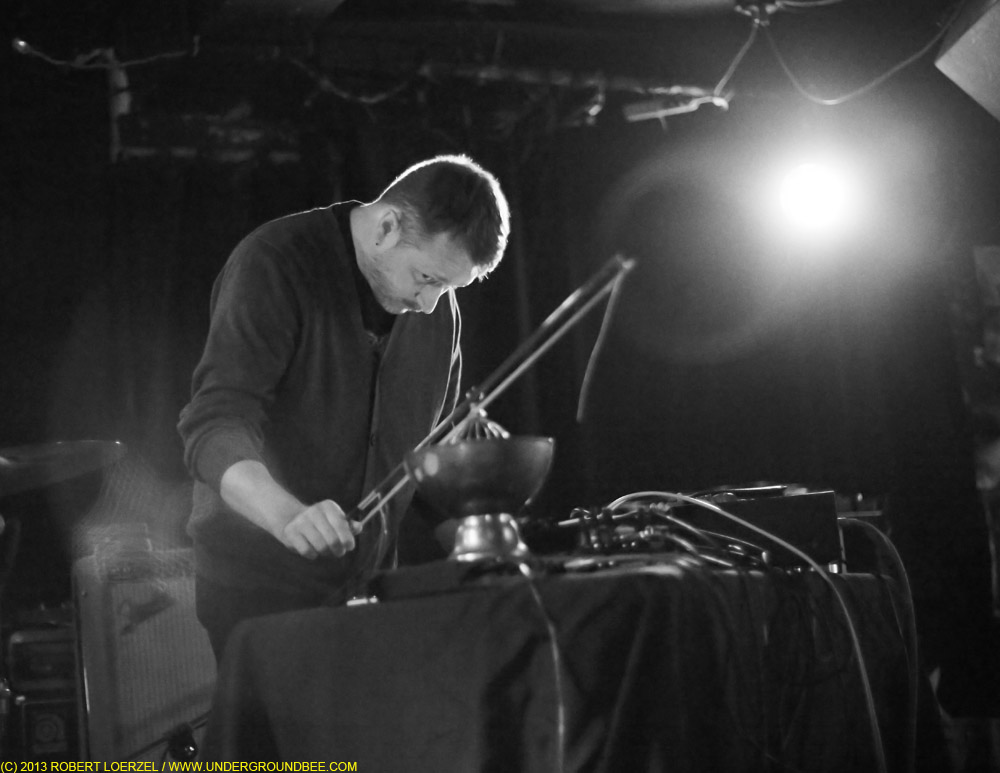
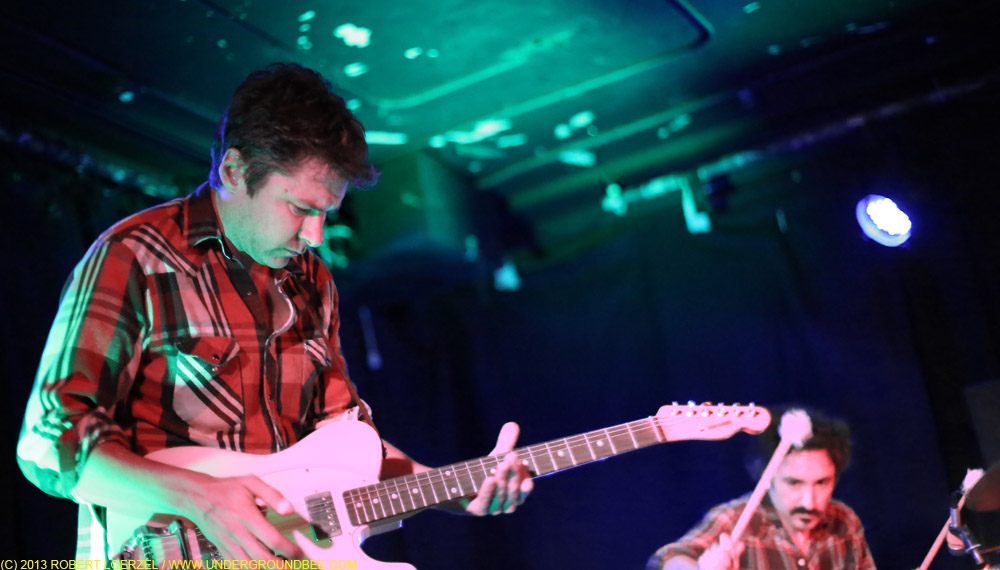
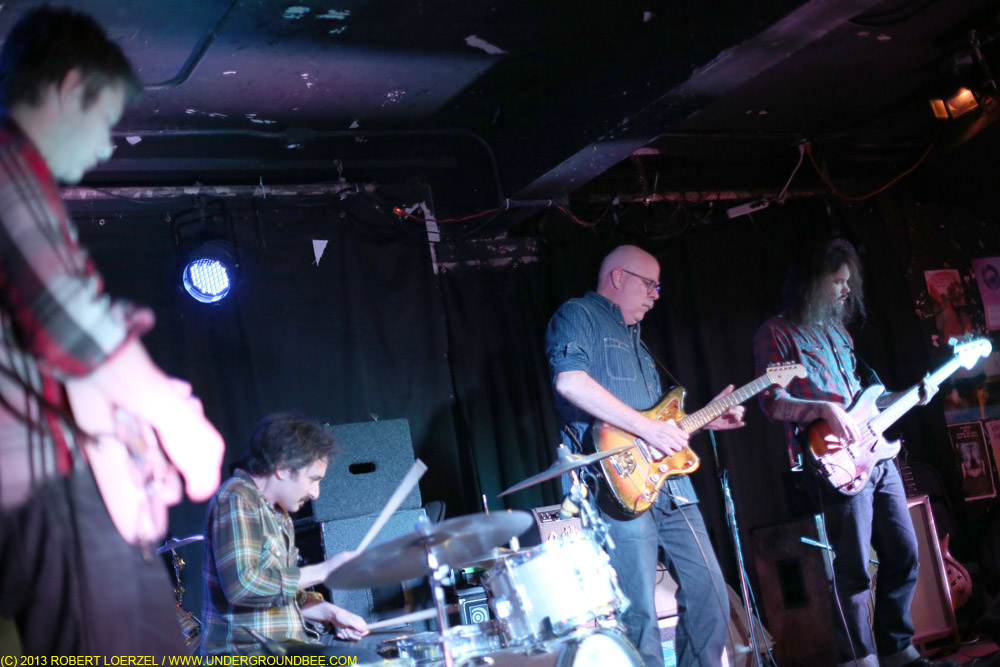
Mark Lanegan and ‘Mack the Knife’
One of the highlights of Mark Lanegan’s enchanting concert tonight at the Old Town School of Folk Music was his performance of the classic Kurt Weill-Bertolt Brecht song “Mack the Knife,” which he recorded for his new album, the covers collection Imitations. After the concert, I was talking about that song with some friends. It has been a subject of fascination for me — how this grim ballad of murder ever became a jaunty, jazzy pop hit. Lanegan’s version ranks up there with the best, thanks to those gritty, sandpaper vocals of his. But I don’t know that there is such a thing as a definitive version of “Mack the Knife.”
For one thing, which lyrics are definitive? Marc Blitzstein’s translation is the most famous English version, but it doesn’t convey all of the terrifying details in Brecht’s original German lyrics. Here’s a translation I made myself, back when I was taking German classes. (I haven’t stayed in practice, and I’m nowhere close to fluent in German these days. Feel free to offer corrections or suggested changes.) I tried to make the translation as literal as possible.
The Ballad of Mack the Knife
And the shark, oh, it has teeth
And it wears them in its face.
And Macheath, he has a knife,
But this knife, no one sees.
Oh, how red is the shark’s fin,
when the blood flows.
Mack the Knife, he wears a glove,
From which no atrocity can be read.
In the Thames’ green waters,
People suddenly fall.
Is it either plague or cholera?
No, it means Macheath’s been around.
On a beautiful blue Sunday,
A dead man lies on the beach
And a man goes around the corner
Known as Mackie the Knife.
And Schul Meier is still missing
And so many rich men,
Mackie the Knife has his money,
But no one can prove anything.
Jenny Towler was found
With a knife in her breast,
And on the dock goes Macheath,
Who knows nothing at all.
Where is Alfons Gilte, the cabman?
Will this ever come to light?
Anyone could know.
Macheath knows nothing.
And the great fire in Soho,
Seven children and an old man.
In the crowd, Mackie the Knife —
He’s not asked and doesn’t know.
And the underaged widow
Whose name everyone knows,
Woke up and was raped.
Mackie, what was your price?
For some are in darkness
And some are in light.
One sees those in light,
But those in darkness, one sees not.
The original German lyrics:
Die Moritat von Mackie Messer
Und der Haifisch, der hat Zähne
und die trägt er im Gesicht
und Macheath, der hat ein Messer
doch das Messer sieht man nicht.
Ach, es sind des Haifischs Flossen
rot, wenn dieser Blut vergießt.
Mackie Messer trägt ‘nen Handschuh
drauf man keine Untat liest.
An der Themse grünem Wasser
Fallen plötzlich Leute um!
Es ist weder Pest noch Cholera
Doch es heißt: Macheath geht um.
An ‘nem schönen blauen Sonntag
liegt ein toter Mann am Strand
und ein Mensch geht um die Ecke
den man Mackie Messer nennt.
Und Schmul Meier bleibt verschwunden
und so mancher reiche Mann
und sein Geld hat Mackie Messer
dem man nichts beweisen kann.
Jenny Towler ward gefunden
mit ‘nem Messer in der Brust
und am Kai geht Mackie Messer
der von allem nichts gewußt.
Wo ist Alfons Gilte, der Fuhrherr?
Kommt das je ans Sonnenlicht?
Wer es immer wissen könnte —
Mackie Messer weiß nicht.
Und das große Feuer in Soho
sieben Kinder und ein Greis —
in der Menge Mackie Messer, den
man nicht fragt und der nichts weiß.
Und die minderjährige Witwe
deren Namen jeder weiß
wachte auf und war geschändet —
Mackie, welches war dein Preis?
Denn die einen sind im Dunkeln
und die and’ren sind im Licht,
und man siehet die im Lichte,
die im Dunkeln sieht man nicht.
Ólafur Arnalds at Constellation
Constellation — Mike Reed’s music and arts venue in the old Viaduct Theatre space — has been hosting some interesting concerts since opening earlier this year. So far, it’s living up to its promise as a home for music of various genres outside of the mainstream. Located on Western Avenue’s frontage street, along the stretch where the main part of Western Avenue ascends on a bridge over Belmont, Constellation has a barely noticeable sign identifying the venue. The front door could be mistaken for an entrance into a warehouse. On Thursday night (Oct. 3), the music behind that door was the elegant and spare quasi-classical, quasi-electronic, quasi-indie rock of Icelandic composer and pianist Ólafur Arnalds.
He played two sets that night in the smaller of Constellation’s two performance spaces; I caught the late show. Before he sat down at the piano, Arnalds apologized for being tired, saying he’d flown from San Diego to Chicago around 3 a.m. and had barely slept. He said he’d nodded off three times during the short interlude between his two Constellation performances. “This is a strange place for a concert,” he said, looking around the room, which has the plain, unadorned style of a music or dance rehearsal space. “It’s the smallest place we’ve played in years.” Later in the show, he remarked: “It kind of feels like playing in my living room, which is nice. … It’s like you didn’t pay 30 bucks to see me and I just invited you.” (According to Althea Legaspi’s review for the Chicago Tribune, he made similar remarks at the early concert.)
Arnalds asked the audience to sing a middle C, which he recorded and played back on his iPad, which was sitting on top of the piano. He joked that he could switch out this crowd’s vocals with a prerecorded track if he needed to, and we wouldn’t realize what he’d done — but then he praised us for doing a good job. With that “ah” sustaining in the background, Arnalds began playing the piano.
Throughout the concert, as Arnalds played songs from his latest album, For Now I Am Winter, and other recordings, he kept his hands clustered together near the middle of the keyboard. His right hand seemed to stay in the octave above Middle C, while the left hand stayed in the space just below Middle C, both playing spare, seemingly simple sequences of notes. Arnalds doesn’t appear to be striving for impressive virtuosity; rather, he’s striving to convey his melodies and musical moods in a clear, distilled form. (His website includes free downloadable sheet music of some compositions.)
Violinist Viktor Orri Árnason (of the band Hjaltalín) and cellist Rubin Kodheli accompanied Arnalds, and so did that iPad, which delivered electronic beats, ambient textures and other recorded tracks, without ever overwhelming the live performers. An extended and expressive solo by Árnason was one of the concert’s high points, leaving the strings of his bow shredded by the end. “I guess I have to buy him a new bow,” Arnalds commented.
Vocalist Arnór Dan Arnarson (of the band Agent Fresco) also joined in with the group on a few songs, singing in a high, quivering voice a bit reminiscent of Antony Hegarty. He had apparently just joined the tour. “He wasn’t supposed to be here tonight,” Arnalds said. “He just showed up.”
The audience applauded enthusiastically after Arnalds and his musicians left the room. Finally, he sleepily wandered back in. Someone in the crowd called out, “Sorry!” Arnalds remarked, “I took a while because I fell asleep … It’s very lovely to play when you haven’t slept for 24 hours.”
For his final song of the night, Arnalds played “Lag fyrir ömmu,” which means “Song for Grandma.” As he explained, the song is dedicated to his late grandmother, “the person who got me into this non-death-metal music.” Arnalds was alone now in the performance section of the room, playing on the piano without any accompaniment. Midway through the song, the sound of Árnason’s violin drifted in from the room next door. Árnason did not come back into the room, but his violin solo sounded like a voice calling from the distance. It was a beautiful and touching moment.
Thursday’s concert also included a lovely opening set by Danish singer-songwriter Lisa Alma, whose soft, meditative ballads started out the evening on a sweet note.
Nick Lowe at Space
With his last several albums, Nick Lowe has settled into a new phase of his career: more of a mellow crooner than the pub rock and power pop guy he was during his youth. But one thing that hasn’t changed is Lowe’s ability to write perfect little songs, with smart and witty lyrics and catchy melodies, all within the bounds of what’s considered the traditional pop-song format. Lowe’s latest string of records is just adding more depth to his already deep catalog of unforgettable tunes.
Lowe was alone with his acoustic guitar on the stage Wednesday night (Oct. 2) at Space in Evanston. A few simple, strummed chords and his voice were all he needed. Well, that and his personality. What a charming and gracious fellow.
After playing his first two songs, Lowe looked down at his set list and said his “program” for the night included some of his old hits. “They are surrounded by what you might call my lesser-known pieces,” he said. “I want to apologize in advance if I don’t play your favorite.” There was no need for him to apologize, of course; yes, I can think of some favorite tunes he didn’t play, but what he did play was wonderful.
Lowe interjected some humorous asides during “Trained Her to Love Me,” in which the narrator (presumably not the real-life Nick Lowe) outlines his method of getting women to fall in love with him just so he can break their hearts. “Oh, that’s unforgivable,” Lowe said, to laughter in the crowd.
Lowe’s forthcoming release is a Christmas record, and when he introduced a song from him, he hastened to say: “I can feel you all tensing up, but don’t worry — I’m going to play you the least Christmasy tune.” And in fact, the song — “A Dollar Short of Happy,” which he co-wrote with Ry Cooder — sounded just fine in October.
Lowe added an intro with an Elvis Presley-esque flourish to “I Knew the Bride (When She Used to Rock ‘n’ Roll),” freshening up a song that had started to seem like a cliche after all of the radio play it got.
As he started his encore, Lowe remarked that Chicago was the first place where his old band Rockpile “took off,” which led him to play one of his songs with that band, “When I Write the Book.” Then came his classic, “(What’s So Funny ‘Bout) Peace, Love and Understanding,” which was just as touching as ever. And finally, a new song, “Tokyo Bay,” which he has been playing in concerts since last year.
SET LIST: Where’s My Everything / Heart / Long Limbed Girl / Ragin’ Eyes / Rome Wasn’t Built in a Day / She’s Got Soul / Lately I’ve Let Things Slide / Has She Got a Friend? / Trained Her to Love Me / I Live on a Battlefield / A Dollar Short of Happy / Cruel to be Kind / Raining Raining / Traveling Light / Stoplight Roses / Sensitive Man / Somebody Cares for Me / House for Sale / Without Love / I Knew the Bride (When She Used to Rock ‘n’ Roll) / ENCORE: When I Write the Book / (What’s So Funny ‘Bout) Peace, Love and Understanding / Tokyo Bay
Lowe’s old friend Paul Cebar opened for him Wednesday. (He also opened the last Nick Lowe concert I saw, several years ago at FitzGerald’s.) Cebar’s breezy acoustic songs were a good match with Lowe’s; he played his originals as well as a couple of covers: Magnetic Fields’ “Book of Love” and Lowe’s “Crying in My Sleep.” It’s unusual to see an opening act cover a song by the headliner, but Cebar remarked, “This is one he doesn’t do, so I can do it.” Lowe has songs to spare.
